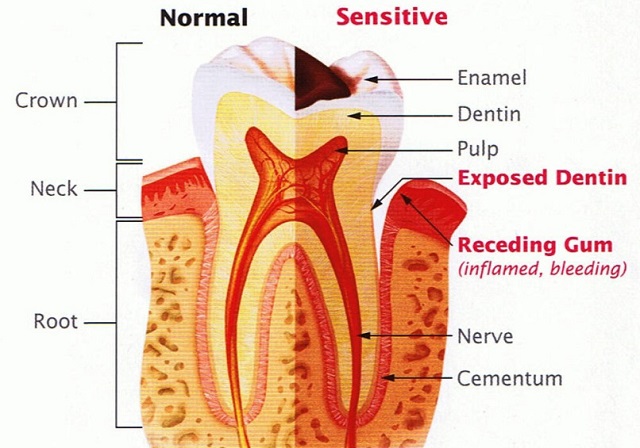
The Sunday News

Health Promotion with Kimberly Nyathi
TOOTH sensitivity is a very common finding, it is also widely known as dentin hypersensitivity, it affects the tooth or exposed root surfaces. This occurs when the enamel (outer tooth layer) that protects our teeth gets thinner, or when gum recession occurs, exposing the underlying surface, the dentin, thus, reducing the protection the enamel and gums provide to the tooth and root. Tooth sensitivity affects up to 57 percent of the general population. Often times this issue dictates a person’s diet by limiting the types and temperature of food that can be consumed.
Symptoms
If hot, cold, sweet or very acidic foods like apples and drinks, or breathing in cold air, makes your teeth or a tooth sensitive or painful then you may have sensitive teeth. Tooth sensitivity can come and go over time. Sometimes it may also be a symptom of pulpits or cavities.
Causes
Key factors that lead to tooth sensitivity are gum recession, and loss of enamel outer tooth surface. Gum recession (gum moving down from the gum line, exposing the root dentin surface) can be caused by loss of periodontal attachment as a result of periodontal disease or by brushing too hard causing gum abrasion. Loss of enamel, on the other hand, occurs when the toothbrush abrades or wears down the enamel surface and exposes the underlying dentin (the layer underneath the enamel).
Enamel loss is more prominent when brushing occurs immediately before or soon after consumption of acidic foods (fruits, tomatoes) and drinks that cause tooth erosion.
Proper oral hygiene is the key to preventing gums from receding and causing sensitive-tooth pain. If you brush your teeth incorrectly using too much pressure or over-brush, your gums may become sensitive.
Prevention
Brushing properly twice daily for 2 minutes with toothpaste that does not have high levels of abrasives, and flossing once a day, can help reduce the chance of tooth sensitivity. A diet low in acidic foods and drinks also helps prevent tooth sensitivity.
Treatment
Desensitising toothpaste. After several applications, desensitising toothpaste can help block and reduce pain associated with sensitive teeth.
Fluoride. Fluoride application to the sensitive areas of your teeth to strengthen tooth enamel and reduce pain.
Covering exposed root surfaces. If receding gums are the cause of your sensitive teeth, your dentist might apply a sealant to cover the exposed tooth roots.
Root canal. If your sensitive teeth cause severe pain and other treatments aren’t effective, a root canal treatment is recommended.
Swap your toothbrush
Brushing can help keep your teeth healthy, but using a hard-bristled toothbrush or a highly abrasive toothpaste can aggravate sensitive teeth. Instead, swap out your usual toothbrush for a softer product.
Avoid acidic foods
Certain foods, like carbonated drinks, coffee, citrus fruits and even yoghurt can cause sensitivity.This is because acidic products can actually be a catalyst to the wearing away of tooth enamel. Consider avoiding them altogether, and if you must have your daily soda, do so by drinking through a straw to limit the contact the liquid has with your teeth. Additionally, don’t brush your teeth right after eating or drinking acidic foods; acid softens your enamel and makes your teeth even more sensitive if brushed against too quickly.
Wear a mouth guard
If you suffer from sensitive teeth, you may grind your teeth at night even if you don’t realise it. Teeth grinding can wear away tooth enamel so they feel sore and sensitive the next day. A mouth guard can help keep you from grinding.
Remember healthy teeth means a healthier and happier you.



